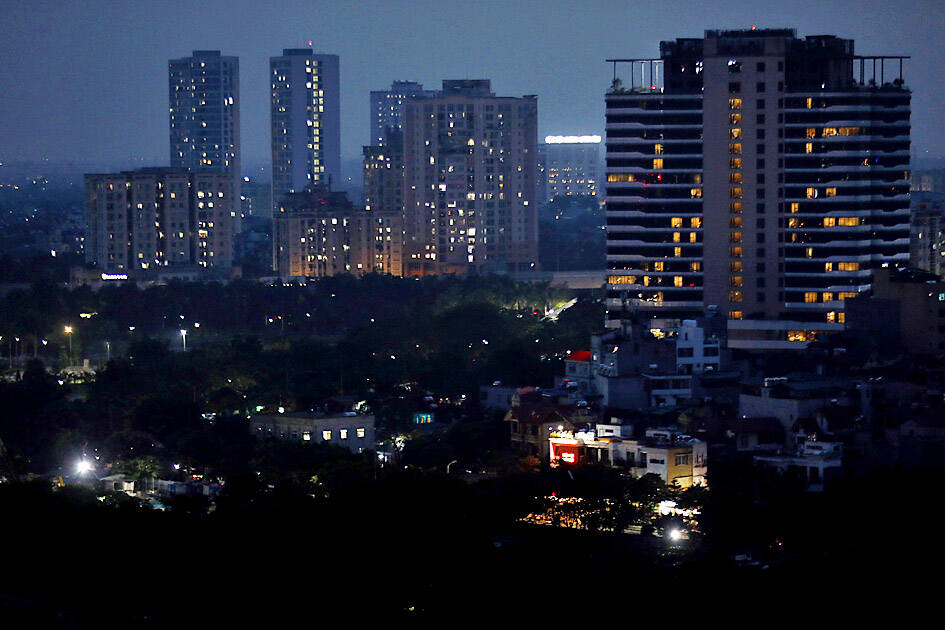Vietnam’s northern province of Bac Giang, home to suppliers for Apple Inc and other global electronics companies, has promised daytime power to factories as blackouts sweep the nation.
Outages have hit industrial parks in some northern provinces including Bac Giang and Bac Ninh, state utility Vietnam Electricity Group’s northern unit has said.
Canon Inc’s factory in Bac Ninh Province faced an outage from 8am on Monday to 5am yesterday, the unit said.

Photo: EPA-EFE
Further disruptions to electricity supply are probably unavoidable as demand overloads the power grid, the utility said.
Soaring power usage in northern Vietnam is expected to continue this month amid intense heat, it said.
Bac Ninh Communist Party Committee Secretary Nguyen Anh Tuan ordered officials to come up with a plan to minimize factory blackouts, particularly for electronics and food processing plants, the Tuoi Tre newspaper reported.
Meanwhile, Bac Giang would secure “uninterrupted” electricity for factories between 7:45am and 5pm starting yesterday, according to a posting on a provincial news Web site, citing a meeting of local officials after the blackouts disrupted production.
The province would prioritize power to households at night.
Bac Giang’s power distribution plan is to run for 20 days and it would be adjusted should the situation change, the report said.
Factories in the nation’s export-dependent economy so far have not complained about a lack of power, Vietnam Association of Foreign Invested Enterprises head Nguyen Mai said.
Many global companies, particularly electronics makers such as Samsung Electronics Co and those with large operations such as Formosa Ha Tinh Steel Corp (台塑河靜鋼鐵興業), have their own sources of electricity, he said by telephone.
Nonetheless, some plants have experienced power shortages, Vietnamese Deputy Minister for Industry and Trade Do Thang Hai said during a weekend briefing, without elaborating.
Most cities and provinces have issued directives to save electricity, resulting in a reduction of about 2.5 percent of daily consumption, Hai said without giving the time frame.
Searing summer temperatures and reduced water levels in hydropower reservoirs are straining Vietnam’s power grid. Thousands of factories have been forced to curb consumption and officials have implemented planned blackouts.
Policymakers are now scrambling to find ways to boost the electricity supply, either by quickly clearing completed renewable projects or bringing in liquefied natural gas imports for the first time.
Bac Ninh People’s Committee Chairman Le Anh Duong urged companies to arrange shifts for the efficient use of power.
Companies with urgent orders should seek their industrial park’s approval to operate extra shifts from midnight until 5am, he said.

Vincent Wei led fellow Singaporean farmers around an empty Malaysian plot, laying out plans for a greenhouse and rows of leafy vegetables. What he pitched was not just space for crops, but a lifeline for growers struggling to make ends meet in a city-state with high prices and little vacant land. The future agriculture hub is part of a joint special economic zone launched last year by the two neighbors, expected to cost US$123 million and produce 10,000 tonnes of fresh produce annually. It is attracting Singaporean farmers with promises of cheaper land, labor and energy just over the border.

US actor Matthew McConaughey has filed recordings of his image and voice with US patent authorities to protect them from unauthorized usage by artificial intelligence (AI) platforms, a representative said earlier this week. Several video clips and audio recordings were registered by the commercial arm of the Just Keep Livin’ Foundation, a non-profit created by the Oscar-winning actor and his wife, Camila, according to the US Patent and Trademark Office database. Many artists are increasingly concerned about the uncontrolled use of their image via generative AI since the rollout of ChatGPT and other AI-powered tools. Several US states have adopted

A proposed billionaires’ tax in California has ignited a political uproar in Silicon Valley, with tech titans threatening to leave the state while California Governor Gavin Newsom of the Democratic Party maneuvers to defeat a levy that he fears would lead to an exodus of wealth. A technology mecca, California has more billionaires than any other US state — a few hundred, by some estimates. About half its personal income tax revenue, a financial backbone in the nearly US$350 billion budget, comes from the top 1 percent of earners. A large healthcare union is attempting to place a proposal before

KEEPING UP: The acquisition of a cleanroom in Taiwan would enable Micron to increase production in a market where demand continues to outpace supply, a Micron official said Micron Technology Inc has signed a letter of intent to buy a fabrication site in Taiwan from Powerchip Semiconductor Manufacturing Corp (力積電) for US$1.8 billion to expand its production of memory chips. Micron would take control of the P5 site in Miaoli County’s Tongluo Township (銅鑼) and plans to ramp up DRAM production in phases after the transaction closes in the second quarter, the company said in a statement on Saturday. The acquisition includes an existing 12 inch fab cleanroom of 27,871m2 and would further position Micron to address growing global demand for memory solutions, the company said. Micron expects the transaction to